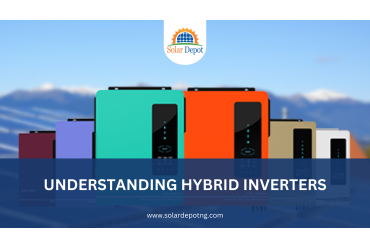Understanding Hybrid Inverters: The Smart Choice for Solar in Nigeria
What Is a Hybrid Inverter and How Does It Work?
A hybrid inverter is a multi-functional solar device that combines the roles of a solar inverter, battery inverter, and grid-tied inverter into one seamless unit. It efficiently manages energy from solar panels, battery storage, and the utility grid, distributing power intelligently based on availability and demand.
How It Works in Real Life:
During the day: Converts DC power from solar panels to usable AC power.
If there’s excess solar energy: Stores it in battery banks for nighttime use.
When solar is insufficient: Pulls electricity from the battery or grid, based on priority settings.
In case of a blackout: Automatically switches to battery backup within milliseconds.
Smart Functionality: Most modern hybrid inverters include MPPT solar charge controllers, energy management software, and remote monitoring features through apps.
Hybrid Inverter vs. Normal Inverter: What’s the Difference?
Many Nigerian households and small businesses are used to traditional (offline or grid-tied) inverters, which only convert battery-stored energy or grid electricity to power household appliances. A hybrid inverter, on the other hand, is more advanced and solar-ready.
Key Insight: Hybrid inverters are better suited for Nigeria’s unstable grid, as they optimize solar use, reduce grid dependence, and support backup power during blackouts.
Top Benefits of Using a Hybrid Inverter in Nigeria
1. Energy Independence: With a hybrid inverter, you're no longer fully dependent on PHCN or generators. The system intelligently prioritizes solar and battery use, making power outages a thing of the past.
2. Maximized Solar Utilization: Unlike traditional systems that waste excess solar during low demand, hybrid inverters store excess solar power in batteries, ensuring nothing goes to waste.
3. Smart Cost Control: The smart energy management system determines the cheapest source of power, helping homeowners and businesses reduce monthly electricity expenses.
4. Real-Time Monitoring: Monitor your energy generation, battery level, and grid usage using smartphone apps or web dashboards—available on brands like Growatt, Huawei, and SMA.
5. Better Load Management: Some hybrid inverters allow load shifting, where non-essential appliances are automatically turned off when battery power is low, extending your backup time.
6. Battery Flexibility: Many hybrid inverters support both lithium-ion and lead-acid batteries, giving you more options depending on your budget and energy needs.
How Hybrid Inverters Help You Save More on Electricity Bills
Common Household Scenario:
A typical 4-bedroom home in Abuja using a 3kW hybrid solar system can cut monthly electricity bills from ₦30,000 to around ₦10,000 by relying more on solar and battery power.






